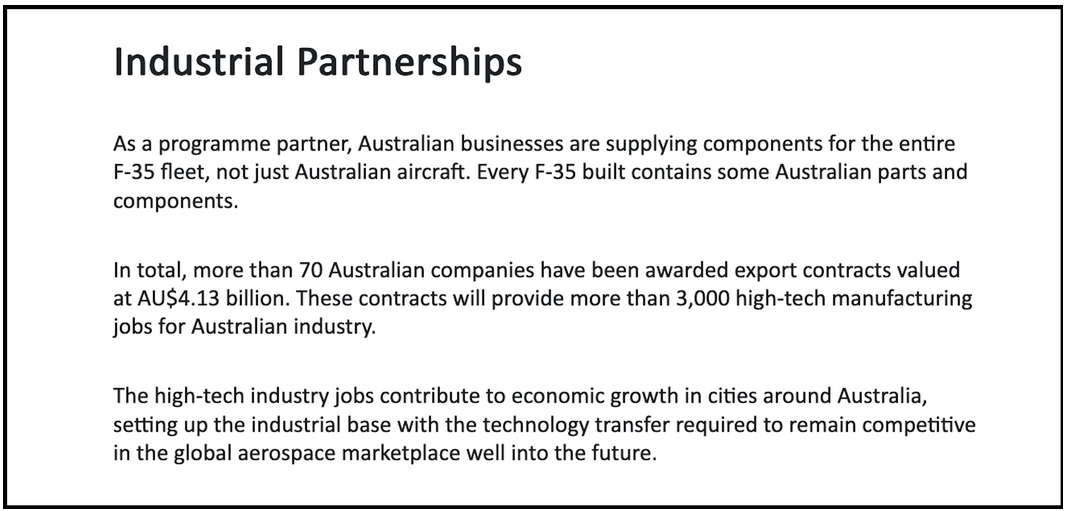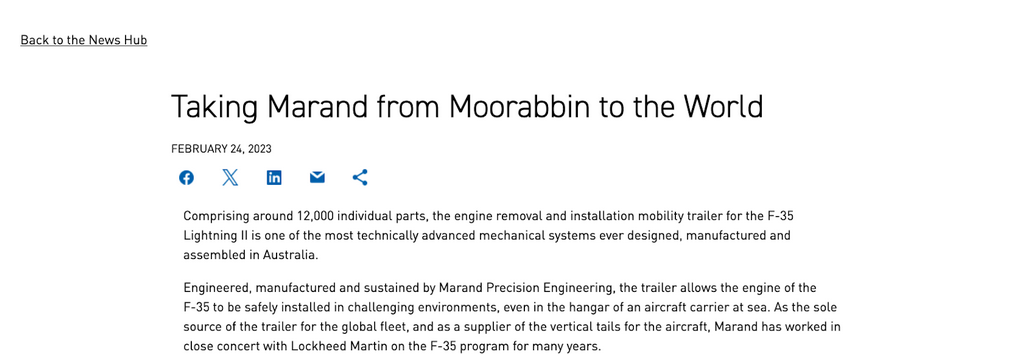
The world’s biggest weapons manufacturer, Lockheed Martin, has deleted from its website details about Australia’s key role in building F-35 fighter jets, which Israel is using to bomb Gaza.
Among details quietly scrubbed from Lockheed Martin’s site are that Australian businesses are supplying components “for the entire F-35 fleet” and that: “Every F-35 built contains some Australian parts and components.”
The material was included in the section “Industrial Partnerships”, which has been deleted entirely, sometime between March 15 and April 7.
Around that time, Lockheed Martin and the Anthony Albanese government were under heavy scrutiny following a February Senate hearing in which the supply of “weapons” to Israel was hotly contested, specifically F-35 parts and components.
The deleted “Industrial Partnerships” section of the Lockheed Martin site states: “As a programme partner, Australian businesses are supplying components for the entire F-35 fleet, not just Australian aircraft.”
It continues: “In total, more than 70 Australian companies have been awarded export contracts valued at AU$4.13 billion.”
Web archive WayBack Machine, which sporadically screenshots webpages, shows the “Industrial Partnerships” section was on Lockheed Martin’s site until March 15, but had been deleted by April 7, the next time it screenshot the page.
deleted_from_lockheed_martins_f-35_website_source_wayback_machine.png

Also deleted from the site is a profile of Melbourne F-35 parts manufacturer Marand Precision Engineering, which supplies the F-35 “global fleet” with an “engine removal and installation mobility trailer” comprised of “around 12,000 individual parts”.
The Marand article was on the Lockheed site when the Wayback Machine took a screenshot of the page on March 28, but it had been deleted by the time of the next screenshot taken on May 9.
Lockheed Martin’s Australian F-35 page now only contains information relating to the Australian Defence Force’s F-35 program.
deleted_from_lockheed_martins_f-35_website_2_source_wayback_machine.png

NSW Greens Senator David Shoebridge tried (and failed) to move a motion in the Senate on March 25 that accused the federal government of being “content to send weapons and weapons parts to Israel to literally fuel the genocide”.
Participating in a Senate committee, Shoebridge asked Hugh Jeffrey, a Department of Defence deputy secretary, on February 14: “Do you consider parts of an F35 fighter jet, such as the parts manufactured in Australia and used on Israeli Defence Force fighter jets to open the bomb bay doors, to be weapons?”
Jeffrey responded: “A pencil is used for writing. It’s not designed in and of itself to be a weapon, but it can be, if you want to use it as a weapon.”
Shoebridge responded: “Bomb bay doors are generally used to release bombs.”
Jeffrey said that under the UN definition “weapons are defined as whole systems”, such as “armoured vehicles”, “tanks” and “combat helicopters”.
The Albanese government has repeatedly said that no “weapons” have been sent to Israel for at least the past five years.
Focusing on the word “weapons” enables the government to ignore exports of “ammunition/munitions” and “parts and components”, all of which are covered by the 2014 Arms Trade Treaty, which Australia championed at the United Nations and ratified in 2014.
The Albanese government is coming under increasing pressure, with concerns mounting that Australia will be found to be complicit in genocide because it has not ceased its military exports to Israel.
More than 2339 public servants released a signed open letter calling on the government to immediately stop all military exports to Israel.
The Department of Defence has admitted it approved two new export permits to Israel after the October 7 attack.
In a Senate estimates hearing on February 14, Jeffrey said: “Two export permits have been granted since the time of the last estimates”, the date of which was 25 October 2023.
The permits were approved between October 25 and October 31. Jeffrey refused to say what items the new permits covered.
The Defence Department and the Department of Foreign Affairs and Trade have also refused to answer questions about whether approved military export permits that were in place before the Hamas attacks have been suspended.
More than 70 Australian companies supply parts and components into the global supply chain of the F-35.
Several companies are the sole source of the parts they produce. Without them, new F-35 jets cannot be built, nor can parts be replaced.
In December last year a US Congressional hearing revealed that the F-35 joint program office had been moving “at a breakneck speed to support … Israel … by increasing spare part supply rates”. [Emphasis added.]
The Defence Department issued a media release on October 30 trumpeting the important role played by Australian industry in the production and maintenance of the global F-35 fleet.
The release announced that Melbourne company Rosebank Engineering had established an important repair depot under the F-35 global support solution for aircraft operating in or deployed to the Indo-Pacific region.
Rosebank Engineering and the Defence Department had partnered with the US F-35 joint program office and Lockheed Martin to establish the new facility.
Rosebank has been part of the F-35 supply chain since 2004 and now manufactures more than 150 components for the landing gear and weapons bay systems on the F-35, including the components that enable the bombs to be dropped on Gaza. Rosebank (formerly RUAG Australia) is the sole source global supplier of the F-35’s “uplock actuators” that open and close the F-35’s weapons bay doors.
Sydney-based Quickstep Holdings is another long-term supplier to the F-35 program.
In December 2020, it announced it had produced its 10,000th component — just 20% of its commitment to the program. Quickstep manufactures more than 50 components and assemblies, worth about $440,000 in each F-35, it says.
Lockheed Martin also acknowledged Queensland’s Ferra Engineering in providing products for the F-35 since 2004 and said it remained a vital partner.
Rosebank Engineering, Quickstep Holdings and Ferra Engineering have all supplied parts and components into the F-35’s supply chain during the past five years.
[Michelle Fahy is an independent investigative reporter on the weapons industry and its close connections with the Australian government. Her work is available here. This article was first published at The Klaxon on June 5 and is reprinted with permission.]